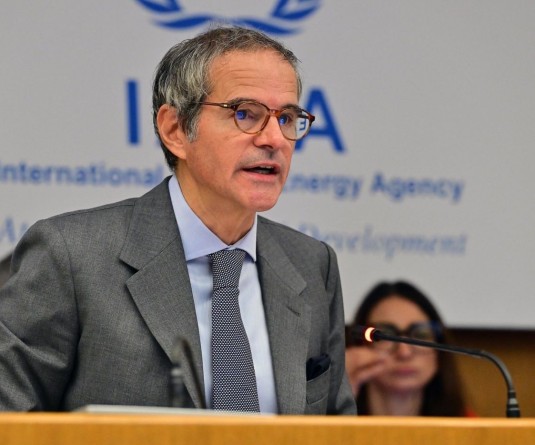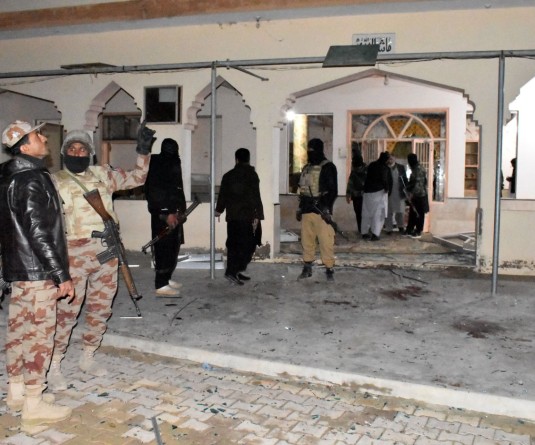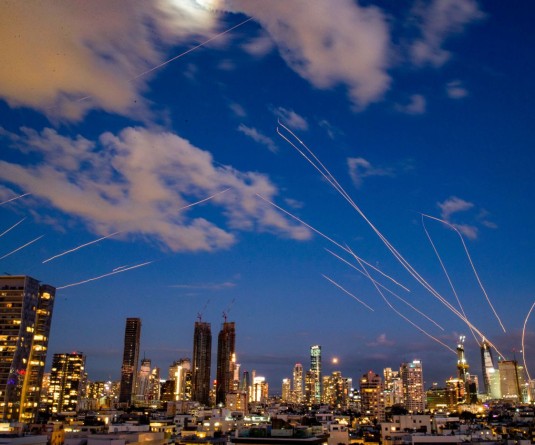
Sky over Tripoli, Libya, is illuminated by explosions during an airstrike, early on Tuesday, May 24. (AP Photo)
TRIPOLI, May 24 (AP): NATO warplanes bombarded targets in Tripoli with more than 20 airstrikes early on Tuesday, striking around Muammar Qadhafi’s residential compound in what appeared to be the heaviest night of bombing of the Libyan capital since the Western alliance launched its air campaign against his forces. The rapid string of strikes, all within less than half an hour, set off thunderous booms that rattled windows, sent heavy, acrid-smelling plumes of smoke over the city, including from an area close to Mr. Qadhafi’s sprawling Bab al-Aziziya compound.
Government spokesman Moussa Ibrahim said at least three people were killed and dozens wounded in NATO strikes that targeted what he described as buildings used by volunteer units of the Libyan army. NATO said in a statement that a number of the strikes hit a vehicle storage facility adjacent to Bab al-Aziziya that has been used in supplying regime forces “conducting attacks on civilians.” It was not immediately clear if the facility was the only target hit in the barrage. Bab al-Aziziya, which includes a number of military facilities, has been pounded repeatedly by NATO strikes.
The military aircraft whooshed low over the city during the night, the strikes coming in series of three loud booms, a pause of minutes punctuated by the hissing sound of low-flying jets, then more shaking, shuddering strikes, shaking windows miles away from Bab al-Aziziya. The sound of other more distant explosions could also be heard. Pro-Qadhafi loyalists beeped their car horns and fired guns, shouting their support for the Libyan leader. Armed men sprayed the night sky with gunfire in response. Men screamed and shouted outside the hotel where journalists were staying, declaring their loyalty to Mr. Qadhafi.
Observers described the bombing as the heaviest attack on the Libyan capital since NATO began its air campaign on March 19 after the passage of a U.N. Security Council resolution to protect civilians after Mr. Qadhafi responded to the public uprising against his rule by unleashing his military and his militias. In one room of the Tripoli Central Hospital, the bodies of three mangled men in their twenties lay on stretchers, their clothing ripped and their faces partially blown away and dusty. A nurse, Ahmad Shara, told reporters taken on a government-escorted visit to the facility soon after the strikes that the men were standing outside their homes when they were killed, presumably by shrapnel.
One man who identified himself as a relative walked into the room where the bodies lay. He halted at their sight, turned around and loudly slapped his hands on a wall as he cried out in shock. Around 10 other men and women lay on stretchers. They appeared moderately to lightly wounded.
“We thought it was the day of judgment,” said Fathallah Salem, a 45-year-old contractor who rushed his 75-year-old mother to the hospital after she suffered shock. The wide-eyed man described how his home trembled, his mother fainted and how the younger of his seven children cried as they heard the rolling explosions.
Government spokesman Moussa Ibrahim said at least three people were killed and dozens wounded in NATO strikes that targeted what he described as buildings used by volunteer units of the Libyan army. NATO said in a statement that a number of the strikes hit a vehicle storage facility adjacent to Bab al-Aziziya that has been used in supplying regime forces “conducting attacks on civilians.” It was not immediately clear if the facility was the only target hit in the barrage. Bab al-Aziziya, which includes a number of military facilities, has been pounded repeatedly by NATO strikes.
The military aircraft whooshed low over the city during the night, the strikes coming in series of three loud booms, a pause of minutes punctuated by the hissing sound of low-flying jets, then more shaking, shuddering strikes, shaking windows miles away from Bab al-Aziziya. The sound of other more distant explosions could also be heard. Pro-Qadhafi loyalists beeped their car horns and fired guns, shouting their support for the Libyan leader. Armed men sprayed the night sky with gunfire in response. Men screamed and shouted outside the hotel where journalists were staying, declaring their loyalty to Mr. Qadhafi.
Observers described the bombing as the heaviest attack on the Libyan capital since NATO began its air campaign on March 19 after the passage of a U.N. Security Council resolution to protect civilians after Mr. Qadhafi responded to the public uprising against his rule by unleashing his military and his militias. In one room of the Tripoli Central Hospital, the bodies of three mangled men in their twenties lay on stretchers, their clothing ripped and their faces partially blown away and dusty. A nurse, Ahmad Shara, told reporters taken on a government-escorted visit to the facility soon after the strikes that the men were standing outside their homes when they were killed, presumably by shrapnel.
One man who identified himself as a relative walked into the room where the bodies lay. He halted at their sight, turned around and loudly slapped his hands on a wall as he cried out in shock. Around 10 other men and women lay on stretchers. They appeared moderately to lightly wounded.
“We thought it was the day of judgment,” said Fathallah Salem, a 45-year-old contractor who rushed his 75-year-old mother to the hospital after she suffered shock. The wide-eyed man described how his home trembled, his mother fainted and how the younger of his seven children cried as they heard the rolling explosions.






